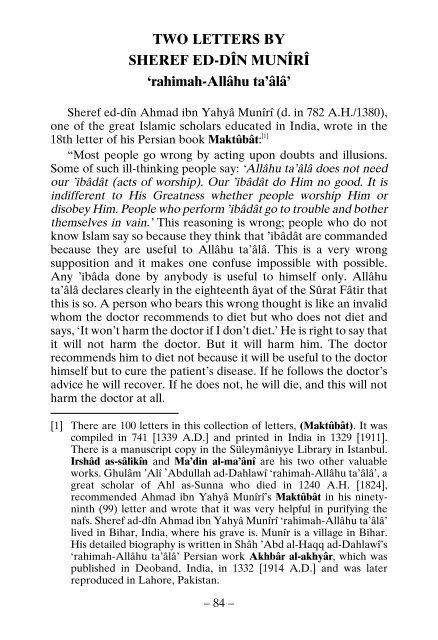Belief and Islam
BELIEF AND ISLAM star This work, Belief and Islam, originally was written in Persian under the title I’tiqâd-nâma by Hadrât Mawlânâ Khâlid al-Baghdâdî, a profound ‘âlim of Islam and a specialist in ma’ârif of tasawwuf. Hâji Faydullah Effendi of Kemah, a khalîfa of great walî Mavlânâ Mahmûd Sâhib, the brother of the author, translated the book into Turkish and named it Farâid-ul-fawâid which was printed in Istanbul in 1312 A.H.[1894]. Our bookstore had it translated again from the Persian original into Turkish and, some explanations and three chapters, published it with the title Imân ve Islâm in 1966. German, French and Arabic versions are also published by our bookstore. This book, explains five fundamentals of Islam, six fundamentals of îmân and the contemporary information about the matter and refutes those who are against Islam and those who are lâ-madbhabî.
BELIEF AND ISLAM
star This work, Belief and Islam, originally was written in Persian under the title I’tiqâd-nâma by Hadrât Mawlânâ Khâlid al-Baghdâdî, a profound ‘âlim of Islam and a specialist in ma’ârif of tasawwuf. Hâji Faydullah Effendi of Kemah, a khalîfa of great walî Mavlânâ Mahmûd Sâhib, the brother of the author, translated the book into Turkish and named it Farâid-ul-fawâid which was printed in Istanbul in 1312 A.H.[1894]. Our bookstore had it translated again from the Persian original into Turkish and, some explanations and three chapters, published it with the title Imân ve Islâm in 1966. German, French and Arabic versions are also published by our bookstore. This book, explains five fundamentals of Islam, six fundamentals of îmân and the contemporary information about the matter and refutes those who are against Islam and those who are lâ-madbhabî.
Create successful ePaper yourself
Turn your PDF publications into a flip-book with our unique Google optimized e-Paper software.
TWO LETTERS BY<br />
SHEREF ED-DÎN MUNÎRÎ<br />
‘rahimah-Allâhu ta’âlâ’<br />
Sheref ed-dîn Ahmad ibn Yahyâ Munîrî (d. in 782 A.H./1380),<br />
one of the great <strong>Islam</strong>ic scholars educated in India, wrote in the<br />
18th letter of his Persian book Maktûbât: [1]<br />
“Most people go wrong by acting upon doubts <strong>and</strong> illusions.<br />
Some of such ill-thinking people say: ‘Allâhu ta’âlâ does not need<br />
our ’ibâdât (acts of worship). Our ’ibâdât do Him no good. It is<br />
indifferent to His Greatness whether people worship Him or<br />
disobey Him. People who perform ’ibâdât go to trouble <strong>and</strong> bother<br />
themselves in vain.’ This reasoning is wrong; people who do not<br />
know <strong>Islam</strong> say so because they think that ’ibâdât are comm<strong>and</strong>ed<br />
because they are useful to Allâhu ta’âlâ. This is a very wrong<br />
supposition <strong>and</strong> it makes one confuse impossible with possible.<br />
Any ’ibâda done by anybody is useful to himself only. Allâhu<br />
ta’âlâ declares clearly in the eighteenth âyat of the Sûrat Fâtir that<br />
this is so. A person who bears this wrong thought is like an invalid<br />
whom the doctor recommends to diet but who does not diet <strong>and</strong><br />
says, ‘It won’t harm the doctor if I don’t diet.’ He is right to say that<br />
it will not harm the doctor. But it will harm him. The doctor<br />
recommends him to diet not because it will be useful to the doctor<br />
himself but to cure the patient’s disease. If he follows the doctor’s<br />
advice he will recover. If he does not, he will die, <strong>and</strong> this will not<br />
harm the doctor at all.<br />
[1] There are 100 letters in this collection of letters, (Maktûbât). It was<br />
compiled in 741 [1339 A.D.] <strong>and</strong> printed in India in 1329 [1911].<br />
There is a manuscript copy in the Süleymâniyye Library in Istanbul.<br />
Irshâd as-sâlikîn <strong>and</strong> Ma’din al-ma’ânî are his two other valuable<br />
works. Ghulâm ’Alî ’Abdullah ad-Dahlawî ‘rahimah-Allâhu ta’âlâ’, a<br />
great scholar of Ahl as-Sunna who died in 1240 A.H. [1824],<br />
recommended Ahmad ibn Yahyâ Munîrî’s Maktûbât in his ninetyninth<br />
(99) letter <strong>and</strong> wrote that it was very helpful in purifying the<br />
nafs. Sheref ad-dîn Ahmad ibn Yahyâ Munîrî ‘rahimah-Allâhu ta’âlâ’<br />
lived in Bihar, India, where his grave is. Munîr is a village in Bihar.<br />
His detailed biography is written in Shâh ’Abd al-Haqq ad-Dahlawî’s<br />
‘rahimah-Allâhu ta’âlâ’ Persian work Akhbâr al-akhyâr, which was<br />
published in Deob<strong>and</strong>, India, in 1332 [1914 A.D.] <strong>and</strong> was later<br />
reproduced in Lahore, Pakistan.<br />
– 84 –

















